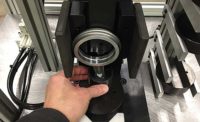Having the right connections can definitely help a person succeed in the business world. Being a company that specializes in connecting things doesn’t hurt, either—even if the connection is a wireless one.
Based in Seattle, Impinj Inc. makes RFID chips used in RAIN (radio identification) RFID labels (also called tags), which enable companies to wirelessly track and manage their assets and inventory in high-volume industries. The types of connected items range from automobile parts and medical supplies, to airline baggage and retail products.
In 2016, Impinj partnered with DELO Industrial Adhesives and equipment supplier Mühlbauer Group to develop Impinj’s Enduro die-attach technology for its Monza 6 RFID chips. The technology involves using a large, flat metal pad to enhance RFID chip bonding to a clear-film inlay antenna.
Two years ago, the three companies reunited for a different reason: To develop a system that can help all RAIN RFID label manufacturers increase their productivity. In this system, a copper-plated version of the Monza 6 chips is used. Like the standard type, these chips offer enhanced privacy protection, adaptive radio frequency tuning and the capability for RFID tag deactivation.
The chips are bonded to inlay antennas on a Mühlbauer DDA (direct die attach) RFID machine using DELO Monopox AC6545, a solvent-free, anisotropic conductive adhesive that adheres well to copper. Curing time is as low as one second when used with a thermode at 230 C. At higher temperatures, shorter curing times can be achieved.
“The fact that our adhesives are in 80 percent of the billions of [these] labels produced annually is a result of our high commitment to advancing the industry,” says Karl Bitzer, Ph.D., head of product management and strategy at DELO. “We have always taken the challenges of our customers very seriously and, with this latest innovation, we continue to solve their problems.”
The Mühlbauer DDA RFID machine is fully automated and can process more than 40,000 inlays per hour. As a single or multi-roll reel of inlays is fed through the machine, each antenna is quickly inspected for accurate placement of the adhesive. After adhesive is jet applied, the antenna center area is verified by vision technology for accurate chip placement via die attach. This is followed by adhesive curing, chip testing and the marking of any defects. Finally, upwinding or slitting is performed on the reel for label conversion.
“We started as the first equipment supplier for RFID chip attach [more than 20 years ago],” notes Gerald Niklas, vice president of business development at Mühlbauer. “Today [this] collaboration [has helped us take] a big step toward the acceptance of RAIN RFID labels in cost-sensitive, ultra-high volume applications.”
“The partnership has significantly improved inlay-manufacturing speeds with world-class quality,” concludes Carl Brasek, vice president of silicon product management at Impinj. “It [brings] us and them closer to our vision of connecting every item in our everyday world.”
Headquartered in Windach, Germany, near Munich, DELO makes a wide range of adhesives that are used in products as diverse as automobiles, mobile phones and aircraft. Well-known customers include Bosch, Daimler, Huawei, Osram Light AG, Siemens and Sony.
For more information, call 978-254-5275 or visit www.delo-adhesives.com/us.





